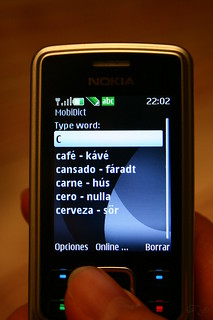 I’ve been faced with many dilemmas this year as I inherited a Spanish 3 class with low proficiency- I mean, at least a couple of Novice High students in Spanish 3. I don’t know how or why exactly they made it through to my class with these struggles. I feel like part of it must have to do with the fact they’ve had 3 teachers in 3 years before me. But there it is: I have a class designed for Intermediate Mid students that I’m teaching to Novice High students. And believe me, we have problems.
I’ve been faced with many dilemmas this year as I inherited a Spanish 3 class with low proficiency- I mean, at least a couple of Novice High students in Spanish 3. I don’t know how or why exactly they made it through to my class with these struggles. I feel like part of it must have to do with the fact they’ve had 3 teachers in 3 years before me. But there it is: I have a class designed for Intermediate Mid students that I’m teaching to Novice High students. And believe me, we have problems.
One problem is dictionary use. Several of these students, instead of exploring what they can do with the language they’ve got or asking questions, look for everything in the dictionary and take it at face value. Problem is, they don’t bother finding out if it’s a noun or a verb, or looking at examples of how it’s used.
Or, in an even more egregious rut, they are trying to say something that’s tweaked just slightly from the Spanish they know, and so they look it up. A recent example is “I have a cat named Kitty.” The student looks it up and finds the word llamado, which of course is fine, but they missed a great point: they knew another way to say it and have since very early Spanish 1. When I push for it, they easily come up with que se llama. And doing it that way reinforces the vocabulary not just for them but also for their classmates.
In any case, I’m not willing to just say, “Oh, well, you should be Intermediate Mid, so we’ll just muddle through.” No, if my students’ proficiency is lower, I need to meet them just above where they are so I can help them move up. With this dictionary issue, that looks like our spring initiative, “Divorce the Dictionary.”
Try banning the dictionaries for a week. Of course, at home it’s just on honor system, but encourage your students to see what they can do to find the tools from you, each other, or their own powers of circumlocution. Mine text each other while doing out-of-class activities to see if someone else knows how to do what they’re trying to do. And some continue to use the dictionary. I just gave one an uncharacteristically low grade on his blog because his obvious dictionary use lowered the comprehensibility considerably. So I showed it to him and said, “See? The dictionary is killing you. Divorce the dictionary.”
This idea fits with something I’ve said for a long time: Translation is a high level skill that novices aren’t capable of, so don’t encourage them to do it.
Foto credit: Artrista Fundamentá
6 Comments
Comments are closed.




AWESOME Idea! I, too, have inherited lower level 3/4’s & they are always literally translating with dictionary or phone! I will put this to use after Spring Break! Again, I am always thankful for how your help so many become better teachers, this goes especially for ME!
I have been teaching lower level 3’s and their excuse is we are a level 3B you can’t expect us to do more, or know more. They say “We are slower, we can’t go as fast, we can learn as quickly” blah blah blah, and all I hear is “don’t expect much from us”. I’ve even gotten a few “I’m american, why do I need to speak Spanish?” But I’ve made up my mind, my level 3’s WILL talk!!
Good attitude! That “why do I need anything but English” perspective is so prevalent at any level!
Thanks for the idea. After years of teaching, I did realize students depended on the dictionary too much. Your post gave me the courage to try it this week. I am thrilled with the results! Thanks again!
So glad to hear the results are great!
[…] For further reading, see my other post on circumlocution from a while back; it’s about banning the dictionary […]